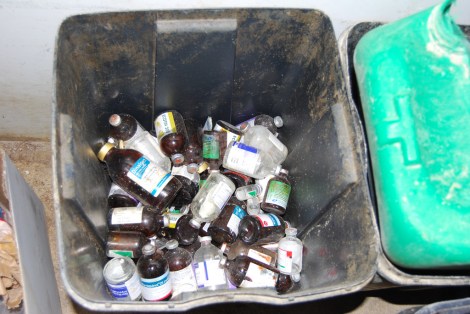Livestock antibiotics may beef up our meat, but they may also create drug-resistant bugs that could one day kill us. Unfortunately, the FDA doesn’t want to tell us what it knows about how much antibiotic use is happening on American farms.

Animal Equality Antibiotics bottles on a pig farm.
Tomorrow, the FDA will hold two public meetings on reauthorization of the Animal Drug User Fee Act, which is due to happen in 2013. One question up for discussion: how much antibiotic info should be publicly released under the act. First passed in 2003, ADUFA took money from frustrated drug companies that wanted to speed up their review process and gave it to the feds to hire more reviewers. (Hiring federal drug reviewers with big drug dollars — not sketchy at all!) The 2008 reauthorization of the act added a provision requiring the FDA to release compiled data on livestock drug use. But this is hardly an open government effort, as Maryn McKenna writes at Wired.
[I]n each year, the FDA released only summed amounts, in kilograms, of all the drugs sold, by all the companies, for all livestock species, across all agricultural uses: growth promoters, prevention, and treatment.
The veterinary pharma companies are not getting together, adding up their sales by drug class for the entire year, and delivering the totals to the FDA. The companies report to the agency individually; they report their data by month, not year; and they report how the drugs are administered, in feed, in water, or by injection.
The FDA receives all this data but is not releasing it, presumably for reasons having to do with its initial ADUFA negotiations with agriculture.
The FDA has already compiled some recommendations for the reauthorization. McKenna:
The recommendations do include a number of things that the agency agrees to change on behalf of veterinary-antibiotic manufacturers, such as agreeing to shorter review times for drug applications, and other “enhancements” of its performance. But there is no sign it has responded to any of the requests made by organizations concerned about the off-farm, downstream, human health effects which occur when those antibiotics are used.
If the FDA doesn’t want to take the public’s comments seriously, it might have to taste the public’s wrath. Earlier this month, the Government Accountability Project filed a lawsuit against the FDA for withholding the animal drug data, despite Freedom of Information Act requests. The FDA claims it’s protecting “confidential commercial information,” a.k.a. trade secrets, which kind of tells us everything we need to know about ADUFA in a nutshell gelatin capsule.



